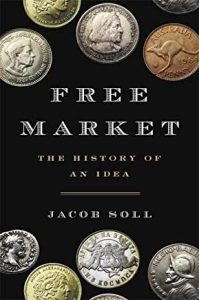There are a couple of important books out in September that I’ve had to restrain myself from writing about too far ahead of publication. Brad Delong’s Slouching Towards Utopia: An Economic History of the 20th Century will be published mid-month. A week or so later – and it can also be pre-ordered now – is Jacob Soll’s Free Market: The History of an Idea. So I’ll write about the latter first.
The premise of the book is that, “We are in an essentially abusive relationship with free market thought,” which has had adverse consequences that finance and big business have stacked the economic system in their favour while the little people take on high debt burdens and pay taxes, in the pretence that ‘the market’ must prevail. To recover from this dysfunctional relationship requires a task of intellectual history. What is this ‘free market’ idea and how has it come to veil a state and regulatory structure favouring the rich over the rest?
The book takes this task seriously: “To understand the origins of free market thought, it is first necessary to understand Cicero’s philosophy.” So, not Adam Smith then. Successive chapters go on to the conceptualisation of markets and what we would now call ‘the economy’ in the late Roman period, the Middle Ages, Renaissance Italy, early modern Britain, Colbertist France, the Dutch Republic, and on through the Enlightenment, French Revolution, Adam Smith, Industrial Revolution and age of Empire.
The book identifies a sort of historical pendulum: “When there is political stability and a developed economic system, it can seem as if markets just emerge on their own and sustain themselves. The fall of Rome, however, showed that when society collapses, strong and sustained state intervention may be necessary to build back the market.” The Mediaeval period was one of these. Another was the Netherlands after the Dutch War of Independence: “Windmills were the product of Dutch traditions of communcal investment dating from privately-funded medieval public works…. Citizen investors worked together to create public infrastructure. This long tradition of private-public partnership laid many of the commercial foundations of the Republic.”
The post-Adam Smith version of free market thinking is traced here to paradoxical roots in Colbert, usually thought of as the architecht of mercantilist state management. The seeming endless violence and suffering experienced by the mass of 17th century French people led Colbert’s sucessors – children and nephews – to turn back to Cicero’s vision of voluntaty exchange among Rome’s aristocracy. Add in Christian ethics and here are the foundations of rational self-interest and ordered exchange. As is now better appreciated, Adam Smith’s free market vision was founded on the ethical system he had written about in his Moral Sentiments before The Wealth of Nations. The free market was built not on greed but on social responsibility.
The book then canters toward the post-1980 bowdlerisation of this free market ideal, via ever faster swings of the pendulum for and against state activity. Soll concludes that much free market thinking is simply utopian, markets as magic. “This model, however, no longer seems realistic or relevant. After decades of deregulation and expanding free trade, the world has experienced regular cycles of economic crashes and government bailouts, along with burgeoning wealth inequality, wars, and climate and health disasters. Equilibrium eludes us.” And indeed the state remains a major economic actor, in the US as well as China, albeit in different guises.
So the dilemma remains: the ‘free market’ is a fiction and we get closest to it in historical periods of stability. But governments can be at best inefficient and at worst corrupt and authoritarian. “But the historical record shows that, as economies grow in complexity, so governments grow in response, for better or worse.” The free market? It would be a good idea. But more important than how the economy is organised is the social and moral context in which we carry out our investments and exchanges. The final word: “Faith in the market alone will not save us but hewing to those old virtues might.”
So, a very interesting read – I really learned a lot from the long historical perspective on the origins of what became the modern version of free market thought. Some of it was a bit surprising & perhaps historians of thought will contest it. I’d have liked more on the post-world war two aspects but that’s probably a different book (and indeed Delong covers that period). I fundamentally agree with the conclusion, though: economies exist in and as part of societies, so the social and moral relations are fundamental. And – for economists – ideas about the right way to behave really matter, not just as innovation or endogenous growth, but (as Deirdre McCloskey has pointed out in her major trilogy) as the enabling or limiting environment for both markets and state to function.


Hi,
Thanks for your work in general. It’s a pleasure to get your summaries and thoughts. I am looking forward to Delong’s book and hope to hear more about it.
As Adam Smith continuously updated WoN and Theory of Moral Sentiments throughout his life, it’s always been odd to me this is overlooked. I do appreciate how you/Soll capture that idea more eloquently than I have.